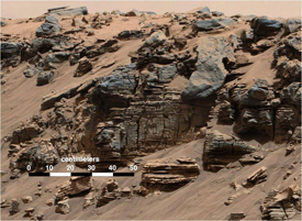| Liquid water on Mars : Researchers have long known that there was water in the form of ice on Mars. Now, new research from NASA’s Mars rover Curiosity shows that it is possible that there is liquid water close to the surface of Mars. The explanation is that the substance perchlorate has been found in the soil, which lowers the freezing point so the water does not freeze into ice, but is liquid and present in very salty salt water – a brine. The results are published in the scientific journal Nature. In August 2012, the Mars rover Curiosity landed on Mars in the large crater, Gale, located just south of the equator. The giant crater is 154 kilometers in diameter and the rim of the crater is almost 5 kilometers high. In the middle of the crater lies the mountain, Mount Sharp. In over 2½ years, Curiosity has travelled approximately 10 km from the landing site towards Mount Sharp and has carried out many studies along the way. | The image is from ‘Hidden Valley’ in Gale Crater on Mars. Very fine-grained sediments, which slowly fell down through the water, were deposited right at the bottom of the crater lake. The sediment plates at the bottom are level, so everything indicates that the entire Gale Crater may have been a large lake. (Credit: NASA/JPL, MSSS) |
Riverbed and enormous lake
The researchers believe that Gale Crater was a large lake between 3.5 and 2.7 billion years ago. Mount Sharp, which is now an approximately five kilometer tall mountain in the middle of the crater, was probably formed by deposits from the crater and the surrounding area. (Credit: NASA/JPL/Caltech/ESA/DLR/MSSS)
Observations by the Mars probe’s stereo camera have previously shown areas characteristic of old riverbed with rounded pepples that clearly show that a long time ago there was flowing, running water with a depth of up to one meter. Now the new close-up images taken by the rover all the way en route to Mount Sharp show that there are expanses of sedimentary deposits, lying as ‘plates’ one above the other and leaning a bit toward Mount Sharp.
The rest of this article can be read at : http://www.nbi.ku.dk/english/news/news15/mars-might-have-liquid-water/

 RSS Feed
RSS Feed